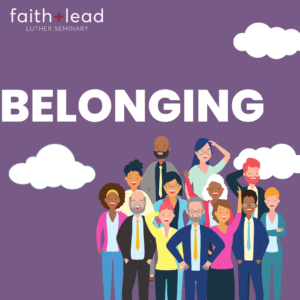Recently I had lunch with an acquaintance who also happens to be an evangelical Christian apologist known for her opposition to same-sex relationships. We talked about our families, the Bible, and Christian representation on TV (we agreed that “Call the Midwife” is one of the most positive portrayals of Christians out there) before departing with a hug. On her way out, she smiled and said, “Reach out if you find yourself in my area again,” and I agreed that I would.
My lunch with this woman is especially notable because I am a lesbian. I’m also happily married to my wife of a decade, and together we are parents of a preschool age daughter. I attend an affirming Christian congregation, and I don’t believe my apologist friend is correct to oppose same-sex relationships. I also don’t think she will ever change her position on the issue (though I suspect she hopes I will change mine). If I’m doing the math right, this acquaintance and I really don’t have any reason to be friendly at all.
Reading through 1 Corinthians lately has illuminated to me why I value this friendship. Here are a few insights I’ve gained from my recent read though the text.
Christian unity matters
Paul writes frequently in 1 Corinthians about the need for unity in the church. In 1 Corinthians 3, he writes, “You are still worldly. For since there is jealousy and quarreling among you, are you not worldly, are you not acting like mere humans? For when one says, ‘I follow Paul,’ and another, ‘I follow Apollos,’ are you not mere human beings?”
The point he is making here, it seems, is that as believers we should think of ourselves as Christians first, not as Baptists first or Lutherans first (or John Piper fans first or ex-vangelicals first). When the Good News and the Christian message become crowded out by human egos and power struggles, the Church appears not divine, but exactly the same as any other group or institution.
Admittedly, the idea of unity among believers today seems far-fetched—and maybe even undesirable. To overgeneralize, conservative Christians view progressive Christians as heretical in their doctrine, while progressive Christians view conservatives as un-Christian in their character. Our cultural and political differences can be so large as to make us question if we are even all talking about the same thing when we say we’re Christians.
I am not discounting those issues, or the significance of substantive disagreements over doctrine or justice. There are big differences and they deserve careful attention. (After all, without the work of activists for LGBT inclusion within the ELCA, I would not have been baptized four years ago as an adult convert to Christianity.)
At the same time, I also don’t forget that communities and institutions aren’t monoliths. Even in 2022, communities are always made up of individuals who can be engaged as the people they are. And other differences aside, I try to view another person who is sharing the Good News of God’s grace and Jesus’ death and resurrection as another Christian. I believe that 1 Corinthians makes the case that we are to seek unity with other Christians as much as possible for the sake of the church and our witness to the world. That is one reason why I find it meaningful to be in contact with my evangelical apologist acquaintance—fundamentally, I see us as being on the same side.
We each have a part in the body of Christ
In 1 Corinthians 12, Paul uses the metaphor of the body of Christ to describe the significance of each believer in God’s work. Each believer is a unique person with their own set of spiritual gifts. Each person is as irreplaceable in the body of Christ as an individual finger or toe.
Isn’t that profound? If we are believers, we are already a part of the body of Christ. Paul writes, “Now if the foot should say, ‘Because I am not a hand, I do not belong to the body,’ it would not for that reason stop being part of the body.” Even if we are excluded by some Christian communities, in the greater reality of Christ’s body, we are already radically included, like feet.
Considering ourselves, as believers, as part of a larger body reminds us of the reality of our belonging. It also reminds us that, like body parts, we have a function to perform. Each believer has essential work to do. For those of us who face exclusion from some Christian communities, like gay, bi, and trans people, reflecting deeply on our part in the body can free us from ruminating on whether we are being included. Instead, we can be redirected to our essential part in Christ’s body. It can also give us confidence to know that we are part of the body, too, even if a hand or an elbow (like my apologist friend) doesn’t see that.
None of this is to say that justice and inclusion aren’t important. But we don’t have to wait for every Christian to change their minds and hearts to understand our part in Christ’s body and the function God wants us to serve in God’s church. (And that’s good we don’t have to wait for everyone to change —because I don’t think we can count on everyone changing any time soon!)
Love is indispensable
While I don’t agree with my evangelical apologist friend on many important doctrinal issues, I do believe that she has shown Christian love towards me, which is our greatest commandment as Christians. In 1 Corinthians 13, Paul writes, “If I have the gift of prophecy and can fathom all mysteries and all knowledge, and if I have a faith that can move mountains, but do not have love, I am nothing.”
When I first reached out to my friend a couple of years ago, it was to express my anger with her about her beliefs and writings. (I’m not proud to say that one phrase in that first email rhymed with “Truck view.”) However, my friend’s reply was gracious, and a conversation developed. At one point, I asked her if she would be willing to speak with me over a video call, so that I could express the hurt I’ve experienced from Christians like her. She agreed, and listened closely to me for over an hour. She had nothing at all to gain from this meeting; I believe she agreed to it out of pure love of neighbor. I was surprised by the extent to which feeling heard by her offered me a sense of relief. It was a month or so after this call that this acquaintance and I met up for lunch.
I have gone from resenting all that this woman represents to admiring her expression of Christian love despite our differences. My own heart has been softened by this experience, and it’s made me hope I can be a similar source of help to someone else, maybe even an unlikely person.
Your turn
It has been reading 1 Corinthians that has helped me understand the significance of this relationship to me. If you find yourself in a similar circumstance, with the chance to engage with a Christian who has very different beliefs, I hope you’ll consider the lessons I learned from Paul:
- Remember that Christian unity matters, just as theology and concerns for justice matter.
- Remember that if you are a believer, you are a part of the body of Christ, with unique gifts to offer and important work to do.
- And remember that our highest calling as Christians is to love.




